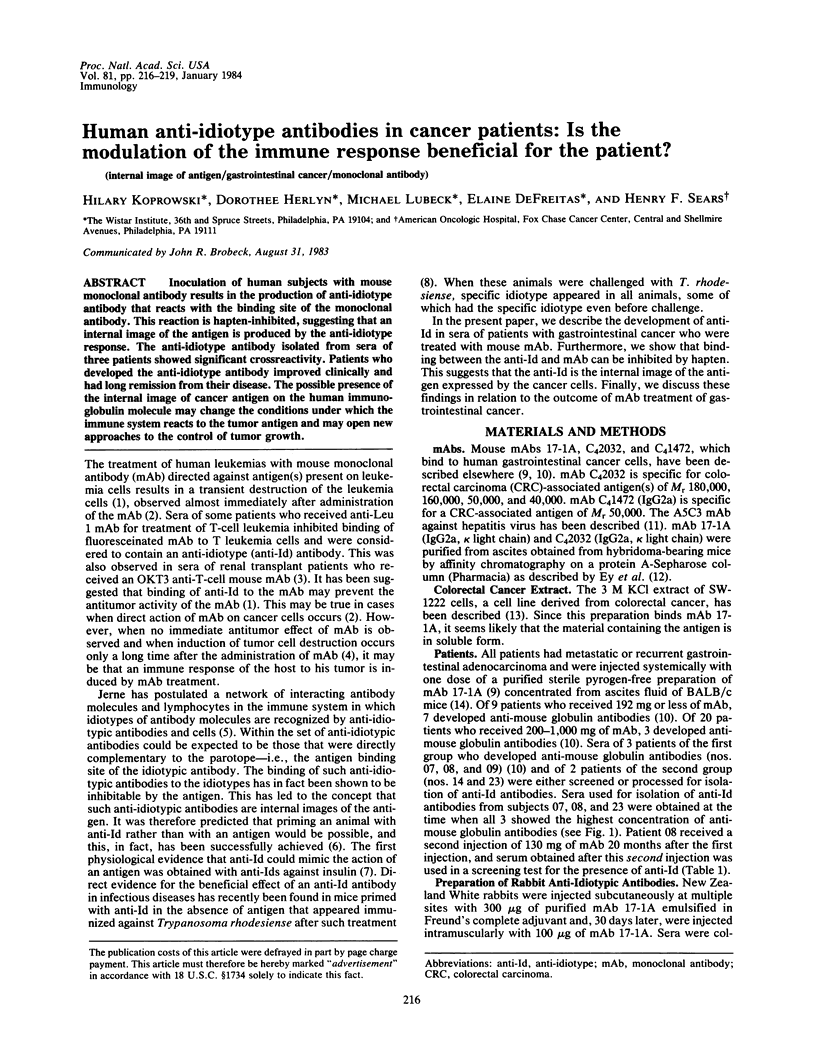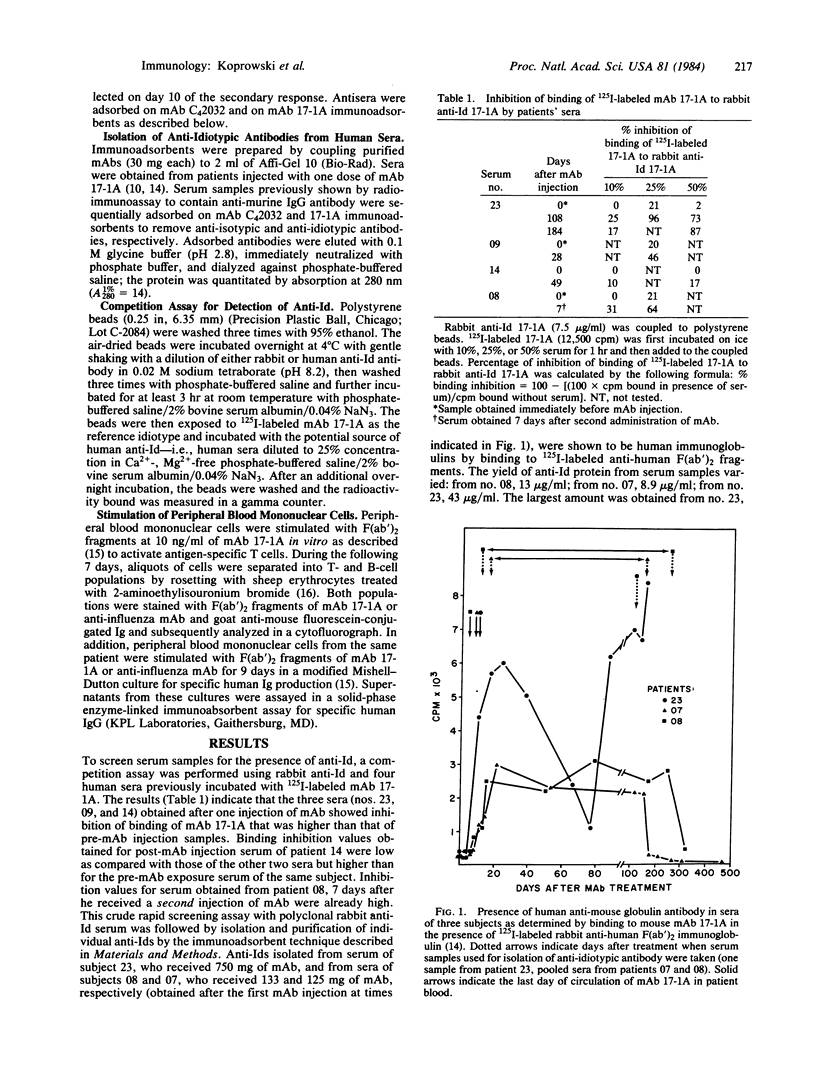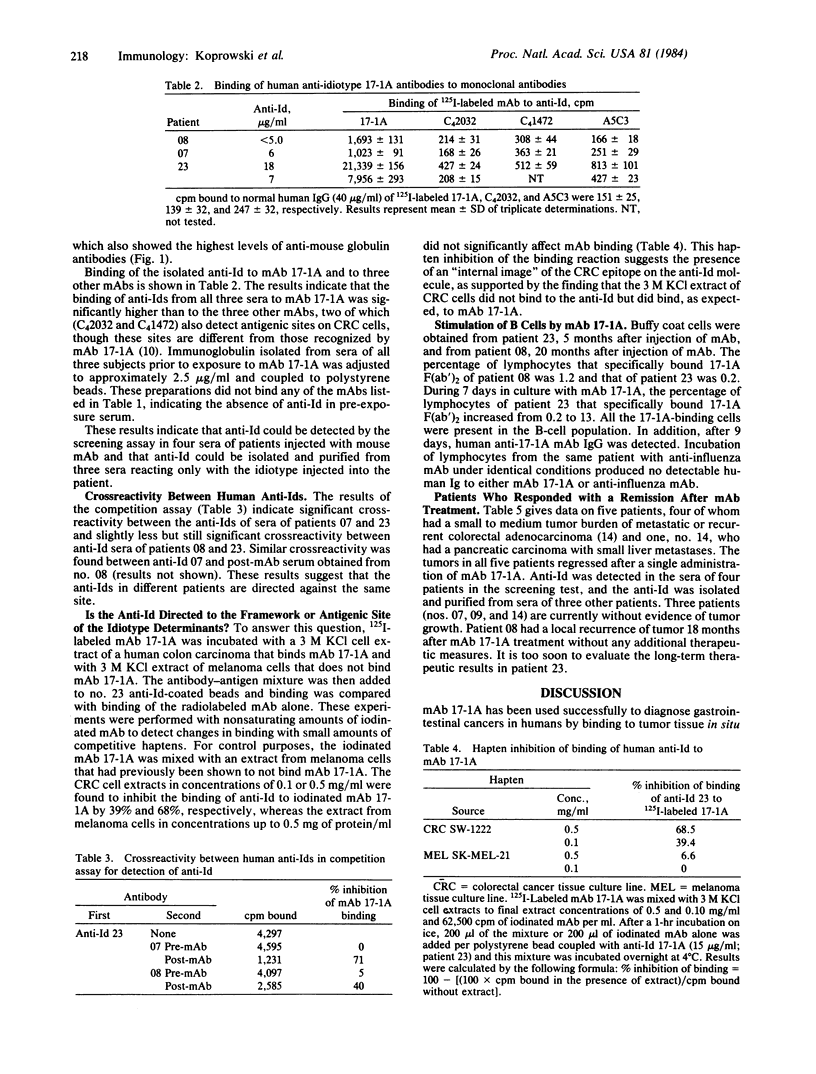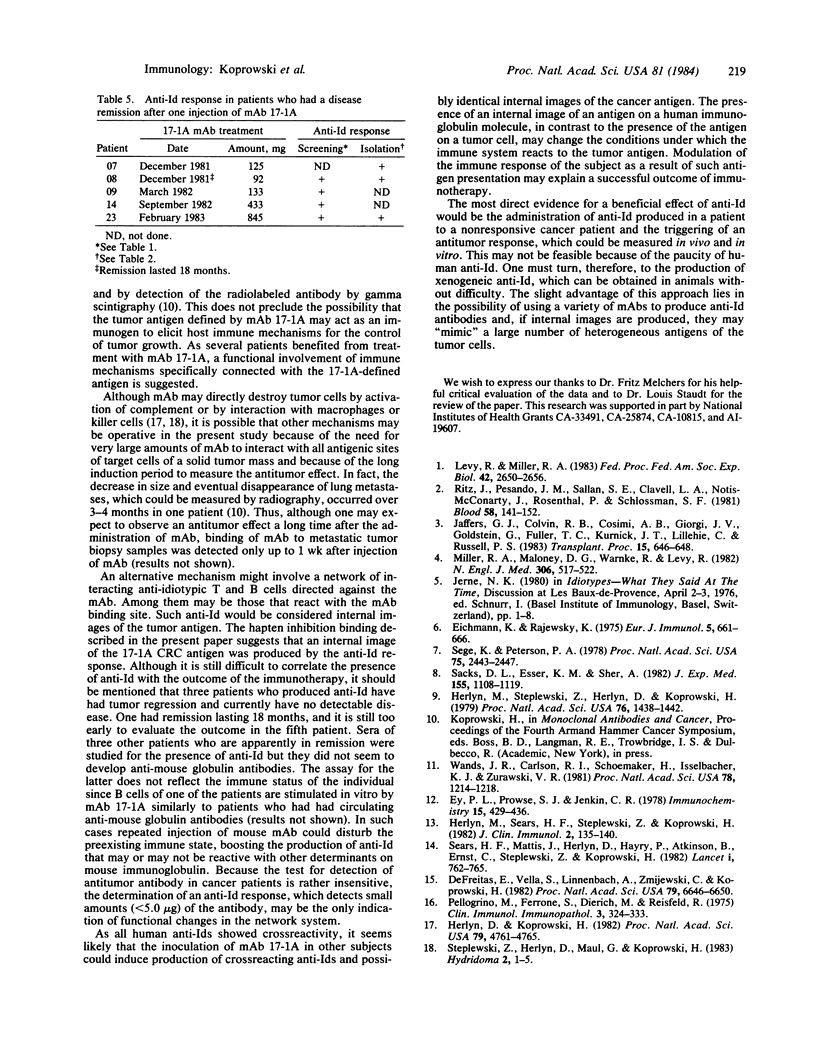Abstract
Inoculation of human subjects with mouse monoclonal antibody results in the production of anti-idiotype antibody that reacts with the binding site of the monoclonal antibody. This reaction is hapten-inhibited, suggesting that an internal image of the antigen is produced by the anti-idiotype response. The anti-idiotype antibody isolated from sera of three patients showed significant crossreactivity. Patients who developed the anti-idiotype antibody improved clinically and had long remission from their disease. The possible presence of the internal image of cancer antigen on the human immunoglobulin molecule may change the conditions under which the immune system reacts to the tumor antigen and may open new approaches to the control of tumor growth.
Full text
PDF



Selected References
These references are in PubMed. This may not be the complete list of references from this article.
- DeFreitas E. C., Vella S., Linnenbach A., Zmijewski C., Koprowski H., Croce C. M. Antigen-specific human T-cell hybridomas with helper activity. Proc Natl Acad Sci U S A. 1982 Nov;79(21):6646–6650. doi: 10.1073/pnas.79.21.6646. [DOI] [PMC free article] [PubMed] [Google Scholar]
- Eichmann K., Rajewsky K. Induction of T and B cell immunity by anti-idiotypic antibody. Eur J Immunol. 1975 Oct;5(10):661–666. doi: 10.1002/eji.1830051002. [DOI] [PubMed] [Google Scholar]
- Ey P. L., Prowse S. J., Jenkin C. R. Isolation of pure IgG1, IgG2a and IgG2b immunoglobulins from mouse serum using protein A-sepharose. Immunochemistry. 1978 Jul;15(7):429–436. doi: 10.1016/0161-5890(78)90070-6. [DOI] [PubMed] [Google Scholar]
- Herlyn D., Koprowski H. IgG2a monoclonal antibodies inhibit human tumor growth through interaction with effector cells. Proc Natl Acad Sci U S A. 1982 Aug;79(15):4761–4765. doi: 10.1073/pnas.79.15.4761. [DOI] [PMC free article] [PubMed] [Google Scholar]
- Herlyn M., Sears H. F., Steplewski Z., Koprowski H. Monoclonal antibody detection of a circulating tumor-associated antigen. I. Presence of antigen in sera of patients with colorectal, gastric, and pancreatic carcinoma. J Clin Immunol. 1982 Apr;2(2):135–140. doi: 10.1007/BF00916897. [DOI] [PubMed] [Google Scholar]
- Herlyn M., Steplewski Z., Herlyn D., Koprowski H. Colorectal carcinoma-specific antigen: detection by means of monoclonal antibodies. Proc Natl Acad Sci U S A. 1979 Mar;76(3):1438–1442. doi: 10.1073/pnas.76.3.1438. [DOI] [PMC free article] [PubMed] [Google Scholar]
- Levy R., Miller R. A. Tumor therapy with monoclonal antibodies. Fed Proc. 1983 Jun;42(9):2650–2656. [PubMed] [Google Scholar]
- Miller R. A., Maloney D. G., Warnke R., Levy R. Treatment of B-cell lymphoma with monoclonal anti-idiotype antibody. N Engl J Med. 1982 Mar 4;306(9):517–522. doi: 10.1056/NEJM198203043060906. [DOI] [PubMed] [Google Scholar]
- Pellegrino M. A., Ferrone S., Dierich M. P., Reisfeld R. A. Enhancement of sheep red blood cell human lymphocyte rosette formation by the sulfhydryl compound 2-amino ethylisothiouronium bromide. Clin Immunol Immunopathol. 1975 Jan;3(3):324–333. doi: 10.1016/0090-1229(75)90019-7. [DOI] [PubMed] [Google Scholar]
- Ritz J., Pesando J. M., Sallan S. E., Clavell L. A., Notis-McConarty J., Rosenthal P., Schlossman S. F. Serotherapy of acute lymphoblastic leukemia with monoclonal antibody. Blood. 1981 Jul;58(1):141–152. [PubMed] [Google Scholar]
- Sacks D. L., Esser K. M., Sher A. Immunization of mice against African trypanosomiasis using anti-idiotypic antibodies. J Exp Med. 1982 Apr 1;155(4):1108–1119. doi: 10.1084/jem.155.4.1108. [DOI] [PMC free article] [PubMed] [Google Scholar]
- Sears H. F., Atkinson B., Mattis J., Ernst C., Herlyn D., Steplewski Z., Häyry P., Koprowski H. Phase-I clinical trial of monoclonal antibody in treatment of gastrointestinal tumours. Lancet. 1982 Apr 3;1(8275):762–765. doi: 10.1016/s0140-6736(82)91811-6. [DOI] [PubMed] [Google Scholar]
- Sege K., Peterson P. A. Use of anti-idiotypic antibodies as cell-surface receptor probes. Proc Natl Acad Sci U S A. 1978 May;75(5):2443–2447. doi: 10.1073/pnas.75.5.2443. [DOI] [PMC free article] [PubMed] [Google Scholar]
- Steplewski Z., Herlyn D., Maul G., Koprowski H. Hypothesis: macrophages as effector cells for human tumor destruction mediated by monoclonal antibody. Hybridoma. 1983;2(1):1–5. doi: 10.1089/hyb.1983.2.1. [DOI] [PubMed] [Google Scholar]
- Wands J. R., Carlson R. I., Schoemaker H., Isselbacher K. J., Zurawski V. R., Jr Immunodiagnosis of hepatitis B with high-affinity IgM monoclonal antibodies. Proc Natl Acad Sci U S A. 1981 Feb;78(2):1214–1218. doi: 10.1073/pnas.78.2.1214. [DOI] [PMC free article] [PubMed] [Google Scholar]



